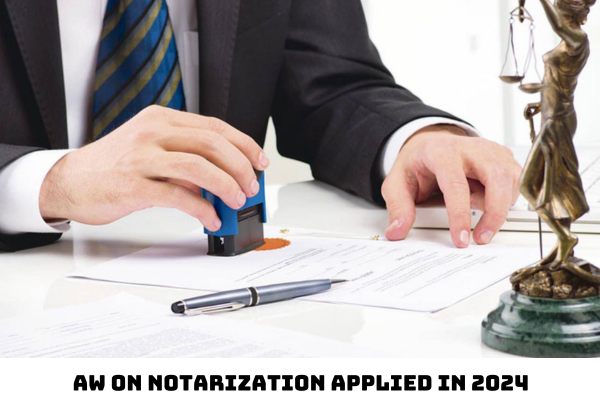Vietnam: What is the newest applicable Law on Notarization? What are the legislative documents guiding the Law on Notarization 2014 in Vietnam?
What is the newest applicable Law on Notarization in Vietnam?
On June 20, 2014, at the 7th meeting of the XIIIth National Assembly, Law No. 53/2014/QH13 (Law on Notarization 2014) was adopted. The State President signed Order No. 08/2014/L-CTN dated 26/06/2014 announcing the Law on Notarization and the Law was effective from January 1, 20155.
The Law on Notarization 2014 consists of 10 chapters, with 81 articles.
- Chapter I: General Provisions (Articles 1 to 7)
- Chapter II: Notaries (from Articles 8 to 17)
- Chapter III: Notarial practice organizations (from Articles 18 to 33)
- Chapter IV: Notaral practice (from Articles 34 to 39)
- Chapter V: Procedures for notarization of contracts, transactions, and translations (from Articles 40 to 61)
- Chapter VI: Notaral databases and preservation of notarial records (from Articles 62 to 65)
- Chapter VII: Notarization charges, notary remuneration, and other expenses (from Articles 66 to 68)
- Chapter VIII: State management of notarization (from Articles 69 to 70)
- Chapter IX: Handling of violations and settlement of disputes (from Articles 71 to 76)
- Chapter X: Enforcement provisions (from Articles 77 to 81)
The Law on Notarization 2014 is amended by two effective documents, the Price Law 2023 and the Law on Amendments to 11 Laws related to Planning 2018.
According to the provisions of Resolution 89/2023/QH15 on the 2024 Law and Ordinance Making Program, adjusting the 2023 Law and Ordinance Making Program, in 2024 the Law on Notarization will have the following changes:
At the 7th meeting (May 2024), the draft Law on Amendments to Law on Notarization shall be submitted to the National Assembly for comments;
In the 8th meeting (October 2024) Law on Amendments to Law on Notarization shall be submited to the National Assembly for approval;
Thus, based on the above provisions, it is expected that in October 2024, the Law on Amendments to Law on Notarization will be passed by the National Assembly of Vietnam. However, there is currently no document to replace the Law on Notarization 2014. Therefore, the Law on Notarization 2024 is still effective until the amendments are approved and take effect.

What are the legislative documents guiding the Law on Notarization 2014 in Vietnam?
The legislative documents guiding the Law on Notarization 2014 include:
- Decree 29/2015/ND-CP guiding the Law on Notarization.
- Circular 08/2023/TT-BTP guiding notarial apprenticeship
- Circular 257/2016/TT-BTC on notarial and authentication service fees, fees for verification of eligibility for practicing as a notary, fees for verification of eligibility for operating a Notary Office, charges for processing of applications for notary card, and the collection, transfer, management.
- Circular 111/2017/TT-BTC on amending Circular 257/2016/TT-BTC on notarial and authentication service fees, fees for verification of eligibility for practicing as a notary, fees for verification of eligibility for operating Private Notary Office, charges for processing of applications for notary card, and the collection, transfer, management.
- Decree 82/2020/ND-CP on administrative penalties in the field of judicial assistance; judicial administration; marriage and family; enforcement of civil judgments; bankruptcy of enterprises and cooperatives.
- Circular 01/2021/TT-BTP guiding the Law on Notarization.
What are the prohibited acts for prices for on-demand notarization-related services in Vietnam?
Under the provisions of Clause 1, Article 7 of the Law on Notarization 2014, there is a phrase replaced by Point b, Clause 9, Article 73 of the Price Law 2023 (effective from July 1, 2024), notaries and notarial practice organizations in Vietnam are prohibited from committing the following acts:
- Disclosing information on the contents of notarized documents, unless notarization requesters so agree in writing or otherwise provided by law; using information on notarized contents to infringe upon lawful rights and interests of individuals and organizations;
- Notarizing contracts, transactions or translations the purposes and contents of which violate law or are contrary to social ethics; inciting or creating conditions for parties to contracts or transactions to conduct sham transactions or commit other deceitful acts;
- Notarizing contracts, transactions or translations which are related to properties or interests of their own or of their relatives being spouses; natural parents, adoptive parents; natural parents, adoptive parents of their spouses; natural children, adopted children or children-in-law; grandparents, siblings or siblings-in-law; and natural grandchildren, adopted grandchildren;
- Refusing notarization requests without plausible reasons; harassing or causing difficulties to notarization requesters;
- Receiving or demanding money or other benefits from notarization requesters in addition to notarization changes, prices for on-demand notarization-related services and other expenses already determined and agreed; receiving or demanding money or other benefits from a third party to settle or refuse to settle notarization requests, causing damage to notarization requesters or related organizations and individuals;
- Forcing others to use their services; colluding with notarization requesters or related persons to falsify contents of notarized documents or notarization dossiers;
- Exerting pressure, threatening or committing acts which are illegal or contrary to social ethics in order to gain advantage for themselves or their organizations in notarial practice;
- Advertising themselves or their organizations in the mass media;
- A notarial practice organization establishing branches, representative offices or transaction places other than its head office; conducting production, business and service activities outside its registered scope of operation;
- A notary practicing his/her profession concurrently at two or more notarial practice organizations or performing other regular jobs;
- A notary participating in the management of an enterprise other than his/her notarial practice organization; providing brokerage or agency services; receiving profits from a contract or transaction that he/she has notarized;
- Committing violations of law or rules on notarial practice ethics.
LawNet